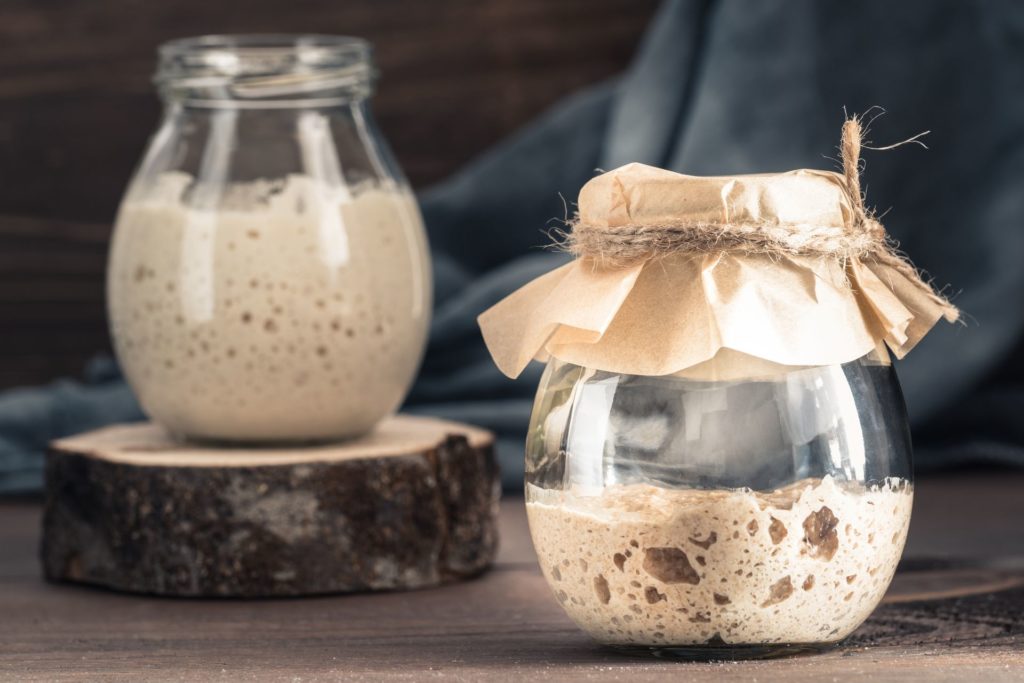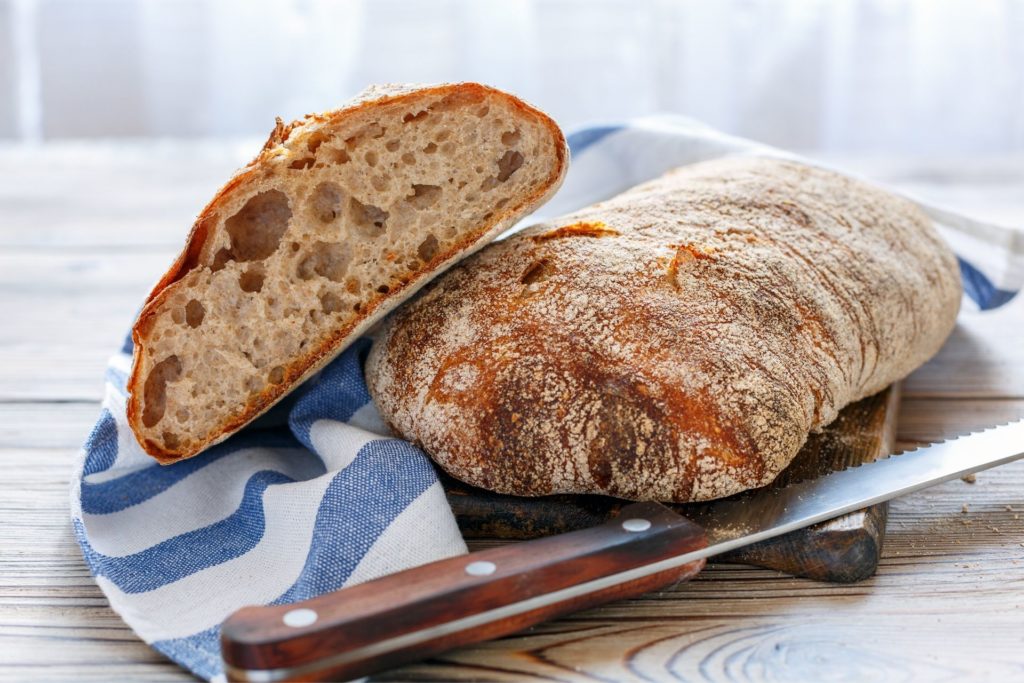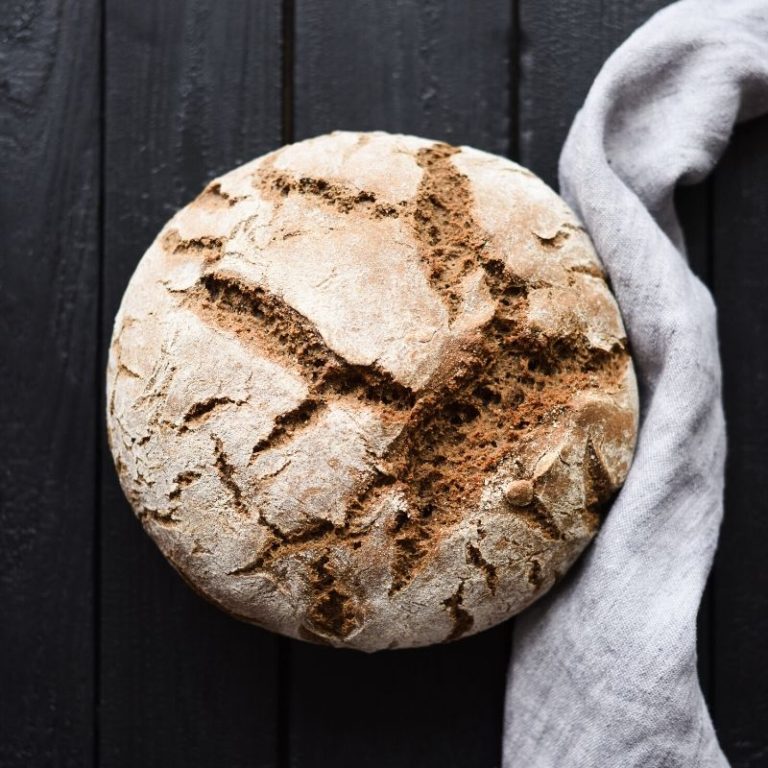Smack dab in the midst of this ongoing pandemic, “the sourdough revival” has emerged. If you’ve been scrolling on your social media, you’ve likely seen a few mouth-watering sourdough creations. From bread to pancakes and everything in between, sourdough has made a comeback.
Three years ago, inspired by a friend’s sourdough baking adventures, I decided to try making my own starter. Needless to say, it was not a success story. Life was busy, I shelved the sourdough idea in the back of my mind and moved on. Prior to COVID, I would treat myself occasionally to a very expensive loaf of artisan sourdough. So delicious and nutritious (more to come on that), but too expensive to fit into my regular budget. Then COVID hits and I had time to face my baking fears and learn something new.
Why Sourdough?

Sourdough in its most simple form only has two ingredients – wheat flour and water. Natural yeast in the environment is “captured” in the sourdough starter. The process then relies on the natural fermentation. This occurs when the natural yeast and lactic acid bacteria are “fed” wheat flour and water.
The quantity of yeast is lower than in baker’s yeast. The fermentation produced by the lactic acid bacteria takes time. And it is this slow process that gives sourdough some unique nutritional benefits.
If you haven’t already jumped on the bandwagon or purchased some artisanal loaves, here’s why you might want to re-consider:
Nutritional benefits of sourdough vs. traditionally made bread
1. More highly absorbed minerals.
The long fermentation time allows for bacteria to break down the phytic acid found in grains. Phytic acid binds to minerals making them difficult to absorb. So, by releasing the phytic acid there are more available minerals in sourdough bread. This means more iron, magnesium and zinc that can be absorbed in your gut. (Read more here).
2. Lower gluten content.
During fermentation, the lactic acid bacteria break down the gluten in wheat flour. This lowers the gluten content when compared to traditional yeast wheat bread, in some cases by up to 50%. This does not make sourdough safe for people with Celiac disease; but, it does mean that people with gluten sensitivity may benefit from choosing sourdough. Gluten free bread is lower than wheat bread in fibre, iron and zinc. Accordingly, for people with gluten sensitivity, sourdough can be a great nutritional option.
3. Lower glycemic index.
Sourdough has a lower glycemic index compared to non-sourdough bread (see this post for a description of glycemic index). Consuming foods with a lower glycemic index helps to maintain more stable blood sugar levels. The lower glycemic index of sourdough is most likely because of the lactic acid bacteria breaking down the simple carbohydrates during fermentation. (More info on this here).
As with most areas of nutrition, we continue to learn more daily. Sourdough is also being studied for how it can help people with Irritable Bowel Syndrome (IBS) and our gut microbiome.
Sourdough and IBS
Since sourdough has fewer FODMAPS (fermentable oligo-, di-, mono-saccharides), it has the potential to benefit people with Irritable Bowel Syndrome (IBS). A recent meta-analysis showed that 50% of people with IBS improved on low FODMAP diet. However, a randomized controlled trial of IBS patients consuming sourdough bread compared to regular wheat bread did not show a significant improvement in symptoms. So while sourdough bread has fewer FODMAPs, making the switch to sourdough bread alone probably won’t resolve your IBS.
Sourdough and the Gut Microbiome
Lactic acid bacteria that play an important role in fermentation also contribute to the make up of our gut microbiome. So it’s reasonable to wonder if consuming sourdough bread can change your gut microbiome. To date research studies have not shown consumption of sourdough to change the bacterial content of an individual’s microbiome; however, the studies have been short in duration and it takes time for dietary interventions to impact the gut microbiome.

Sourdough for Community and Kids
As a dietitian, I know that we eat for more reasons than simply to fuel our bodies. (Though of course, that’s an important one). Another obvious reason we eat is because we enjoy the taste of food. Personally, I love the tangy taste of sourdough.
Food is also a social experience. Unfortunately, COVID stripped us of our social experiences! Despite this, sourdough provided a way for my family to become part of the community again by:
- Getting starter from a friend’s porch
- Sharing my starter with other friends
- Exchanging sourdough recipes with friends and colleagues
- Laughing over our failures; gloating in our sourdough successes!
It has also been a way to teach my kids about foods that usually we buy from the grocery store. This is “food-u-cation” at it’s finest! In these e-learning days, it’s also been a practical way to move math from the computer to the kitchen, learning units of measurement and fractions.
[In case you’re curious, here is our favourite sourdough recipe. The kids also helped me make crackers, a food that usually they’ve thought of as coming from the grocery store. This cracker recipe was a big hit with everyone and 100% whole wheat.]
So is the sourdough revival worth joining? Whether you’re interested in nutritional benefits or a new way to teach your kids math, I’d certainly say so!
Written by Heather Mileski, RD
More about the author. Heather Mileski works as a Registered Dietitian in the Pediatric Gastroenterology Clinic at McMaster Children’s Hospital in Hamilton Ontario where she has 15+ years of experience helping children with their “gastroenterological” concerns (i.e. allergies, irritable bowel syndrome, chron’s and colitis, Celiac disease etc.)






